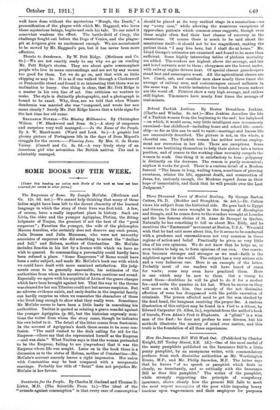SOME BOOKS OF TIIE WEEK.
[Maier this heading v. notice such Books of the week os hay. net 4411 'reserved for review in other forms.] The Empresses of Rome. By Joseph McCabe. (Methuen and Sm. 12s. 6d. net.)—We cannot help thinking that many of these ladies might have been left to the decent obscurity of the learned language in which the story of their lives was first told. A few, of course, have a really important place in history. Such are Livia, the elder and the younger Agrippina, Plotina, the fitting helpmate of Trajan, the greatest if not the best of the " good emperors" ; Faustina the younger, the wife of the philosophic Marcus Aurelius, who certainly does not deserve any such praise, Julia Domna and Julia Mammtea, who were not unworthy associates of emperors who did something to arrest the " decline and fall," and Helena, mother of Constantine. Mr. McCabe includes Zenobia in his list by a licence with which we have no wish to quarrel. So commanding a personality could hardly have been refused a place. "Some Empresses" of Rome would have been a safer subject, and made Mr. McCabe's book one with which we could have dealt with more unmixed satisfaction. His judg- ments seem to us generally reasonable, his estimates of the .authorities from whom his narrative is drawn cautious and sound. Especially we agree with his acquittal of Livia of the grave charges -which have been brought against her. That the way to the throne was cleared for her son Tiberius could not but arouse suspicion. But no adverse evidence exists, and early deaths in the imperial family -can hardly surprise us when we remember the characters of those who lived long enough to show what they really were. Sometimes Mr. McCabe seems to have been a little hasty in consulting his .authorities. Tacitus is quoted as relating a grave scandal against the younger Agrippina (p. 99), but the historian expressly men- tions the writer from whom the story came, though he indicates his own belief in it. The detail of the litter comes from Suetonius. in the account of Agrippina's death there seems to be some con- fusion. " The maid rushed to the deck calling for aid for the Empress—others say that she represented herself as the Empress —and was slain." What Tacitus says is that the woman pretended to be the Empress, failing to see (imprudens) that it was the Empress whose life was sought. Later on in the book there is a -discussion as to the status of Helena, mother of Constantine—Mr. McCabe's account scarcely leaves a right impression. Her union with Constantius may be beat compared with a morganatic marriage. Probably her title of " Saint" does not prejudice Mr. McCabe in her favour.














































 Previous page
Previous page